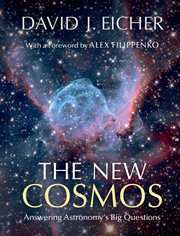Book contents
- Frontmatter
- Dedication
- Contents
- Foreword
- Preface
- Acknowledgments
- 1 The awakening of astronomy
- 2 How the Sun will die
- 3 The end of life on Earth
- 4 How the Moon formed
- 5 Where has all the water gone?
- 6 Why did Venus turn inside-out?
- 7 Is Pluto a planet?
- 8 Planets everywhere…
- 9 The Milky Way as barred spiral
- 10 Here comes Milkomeda
- 11 The Big Bang's cosmic echo
- 12 How large is the universe?
- 13 The mystery of dark matter
- 14 The bigger mystery of dark energy
- 15 Black holes are ubiquitous
- 16 What is the universe's fate?
- 17 The meaning of life in the universe
- Glossary
- Bibliography
- Index
Foreword
Published online by Cambridge University Press: 05 December 2015
- Frontmatter
- Dedication
- Contents
- Foreword
- Preface
- Acknowledgments
- 1 The awakening of astronomy
- 2 How the Sun will die
- 3 The end of life on Earth
- 4 How the Moon formed
- 5 Where has all the water gone?
- 6 Why did Venus turn inside-out?
- 7 Is Pluto a planet?
- 8 Planets everywhere…
- 9 The Milky Way as barred spiral
- 10 Here comes Milkomeda
- 11 The Big Bang's cosmic echo
- 12 How large is the universe?
- 13 The mystery of dark matter
- 14 The bigger mystery of dark energy
- 15 Black holes are ubiquitous
- 16 What is the universe's fate?
- 17 The meaning of life in the universe
- Glossary
- Bibliography
- Index
Summary
It's often said that we now live in a “golden age” of astronomy – and indeed, it's true.
Hardly a week goes by without a press release informing the public of a new cosmic discovery made with one or more instruments from the existing arsenal of ground-based and space-based telescopes, or through theoretical and computational studies. Sometimes, especially during national and international meetings such as those of the American Astronomical Society, several new celestial findings are announced each day.
And what amazing developments we have witnessed! Just 2 decades ago, in the mid-1990s, the evidence for “dark matter” was tantalizing but not compelling, contrary to the present situation. In a still greater turn of events, hardly anyone considered the possibility that even more mysterious “dark energy” dominates the mass-energy content of the universe and accelerates its expansion, probably dooming us to end in the Big Chill. Only the first few exoplanets had been discovered, foreshadowing the thousands that are now known or strongly suspected, and the detection of Earth-like exoplanets in the near future was considered unlikely. Given the few observed objects in the Kuiper Belt and their relatively small sizes, for another decade most astronomers would still consider Pluto to be a genuine planet. Black holes, previously popular mainly among the fertile minds of theoretical physicists and science-fiction writers, were suspected to exist but not yet detected beyond reasonable doubt.
As a long-time editor of the well-known Astronomy magazine, author David Eicher gained much experience in bringing celestial highlights to amateur astronomers and astronomy enthusiasts. One could learn the basics of astronomy and physics in standard textbooks, such as my own The Cosmos: Astronomy in the New Millennium (coauthored with Jay M. Pasachoff), but such books are not able to describe new discoveries on short timescales, and much of their volume must remain devoted to the fundamentals. Conversely, amateur astronomy periodicals generally do not provide very detailed analyses of the state of various astronomical subfields, concentrating instead on relatively brief summaries of recent developments.
In this book, on the other hand, Eicher synthesizes a wealth of relatively new information into an interesting, coherent, up-to-date overview of many of the most important and exciting areas of astronomy.
- Type
- Chapter
- Information
- The New CosmosAnswering Astronomy's Big Questions, pp. ix - xPublisher: Cambridge University PressPrint publication year: 2015



